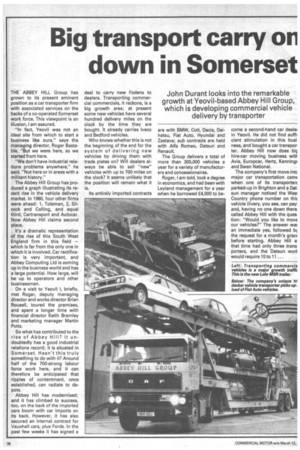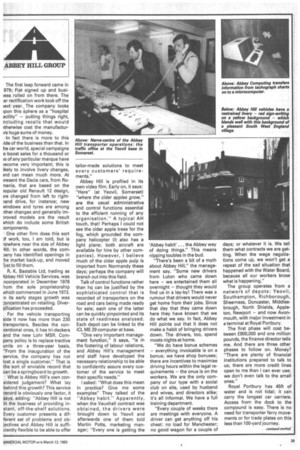Big transport carry on down in Somerset
Page 40

Page 41

If you've noticed an error in this article please click here to report it so we can fix it.
THE ABBEY HILL Group has grown to its present eminent position as a car transporter firm with associated services on the backs of a co-operated Somerset work force. This viewpoint is an illusion, I am assured.
"In fact, Yeovil was not an ideal site from which to start a business like ours," says the managing director, Roger Bastable. "But we were here, so we started from here.
"We don't have industrial relations problems anywhere," he said. "Not here or in areas with a militant history."
The Abbey Hill Group has produced a graph illustrating its recent rise in the vehicle delivery market. In 1980, four other firms were ahead: 1, Toleman, 2, Silcock and Coiling, and equal third, Cartransport and Autocar. Now Abbey Hill claims second place.
It's a dramatic representation of the rise of this South West England firm in this field — which is far from the only one in which it is involved. Car rectification is very important, and Abbey Computing Ltd is coming up in the business world and has a large potential. How large, will be up to operators and other businessmen.
On a visit to Yeovil I, briefly, met Roger, deputy managing director and works director Brian Rousell, toured the premises, and spent a longer time with financial director Keith Bramley and marketing manager Martin Potts.
So what has contributed to the rise of Abbey Hill? It undoubtedly has a good industrial relations record; it is situated in Somerset. Hasn't this truly something to do with it? Around half of the 700-strong labour force work here, and it can therefore be anticipated that ripples of contentment, once established, can radiate to depots.
Abbey Hill has modernised; and it has climbed to success, too, on the back of the imported cars boom with car imports on its back. However, it has also secured an internal contract for Vauxhall cars, plus Fords. In the past few weeks it has signed a deal to carry new Fodens to dealers. Transporting commercial commercials, it reckons, is a big growth area; at present some new vehicles have several hundred delivery miles on the clock by the time they are bought. It already carries Iveco and Bedford vehicles.
Who knows whether this is not the beginning of the end for the system of delivering new vehicles by driving them with trade plates on? Will dealers always be able to sell "new" vehicles with up to 700 miles on the clock? It seems unlikely that the position will remain what it is.
Its entirely imported contracts are with BMW, Colt, Dacia, Daihatsu, Fiat Auto, Hyundai and Zastava; sub contracts are held with Alfa Romeo, Datsun and Renault.
The Group delivers a total of more than 300,000 vehicles a year for a variety of manufacturers and concessionaires.
Roger, I am told, took a degree in economics, and had been with Leyland management for a year when he borrowed f4,000 to be come a second-hand car dealei in Yeovil. He did not find suffi. cient stimulation in this busi. ness, and bought a car transpor. ter. Abbey Hill now does bic hire-car moving business with Avis, Europcar, Hertz, Kennings and Swan National.
The company's first move intc major car transportation came when one of its transporters parked-up in Brighton and a Datsun manager noticed the Wes1 Country phone number on this vehicle (livery, you see, can pay: and, having no one down there, called Abbey Hill with the question: "Would you like to MOVE our vehicles?" The answer war an immediate yes, followed ID), the request for a month's grace before starting. Abbey Hill ai that time had only three trans. porters, and the Datsun wonl. would require 10 to 11 ...
The first leap forward came in 979; Fiat signed up and busiless rolled on from there. The :ar rectification work took off the text year.,The company looks tpon this sphere as a "hospital acuity" — putting things right, ncluding recalls that would ytherwise cost the manufacturors huge sums of money.
In fact there is more to this ide of the business than that. In he car world, special campaigns o boost sales for a thousand or to of any particular marque have )ecome very important; this is ikely to involve livery changes, Ind can mean much more. At resent the Dacia cars, from Ronania, that are based on the )opular old Renault 12 design, ire changed from left to rightland drive, for instance; new windows and tyres are among yther changes and generally imroved models are the result which do include some British omponents.
One other firm does this sort yf work, too, I am told, but is lowhere near the size of Abbey -fill. In other words, the company has identified openings in :he market back-up, and moved 'irst to fill them.
R. K. Bastable Ltd, trading as *bey Hill Vehicle Services, was ncorporated in December 1978 From the sole proprietorship Nhich commenced in June 1972. In its early stages growth was concentrated on retailing. Diversification has proceeded.
For the vehicle transporting side it now has more than 230 transporters. Besides the con ventional ones, it has tri-deckers and the new Lohr MSR. Company policy is to replace tractive units on a three-year basis.
"From the inauguration of the service, the company has not lost a single customer." That is the sort of enviable record that can be a springboard to growth.
What is Abbey Hill's own considered judgement? What lay behind this growth? This service record is obviously one factor, it says, adding: "Abbey Hill is not in the business of providing in stant, off-the-shelf solutions. Every customer presents a dif ferent set of problems and objectives and Abbey Hill is sufficiently flexible to be able to offer tailor-made solutions to meet every customers' requirements."
Abbey Hill is profiled in its own video film. Early on, it says: "Here" (at Yeovil, Somerset) "where the cider apples grow," are the usual administrative and control functions essential to the efficient running of any organisation." A typical AH touch, that! Perhaps I could not see the cider apple trees for the fog, which grounded the company helicopter (it also has a light plane; both aircraft are available for hire by other companies). However. I believe much of the cider apple pulp is imported from Normandy these days; perhaps the company will branch out into this field.
Talk of control functions rather than hq can be justified by the sophisticated control that is recorded of transporters on the road and cars being made ready for sale; each one of the latter can be quickly pinpointed and its state of readiness analysed. Each depot can be linked to the ICL ME 29 computer at base.
"One very important management function," it says, "is in the fostering of labour relations, and Abbey Hill's management and staff have developed the necessary relationship to be able to confidently assure every customer of the service to meet their specific needs."
I asked: "What does this mean in practice? Give me some examples" They talked of the "Abbey habit." Apparently, when the Vauxhall contract was obtained, the drivers were brought down to Yeovil and afterwards one of them told Martin Potts, marketing manager; "Every one is getting the 'Abbey habit' . the Abbey way of doing things." This means nipping toubles in the bud.
"There's been a bit of a myth about Abbey Hill," the management say. "Some new drivers from Luton who came down here — we entertained them all overnight — thought they would find us in a lay-by! There was a rumour that drivers would never get home from their jobs. Since that day that they came down here they have known that we do what we say. In fact, Abbey Hill points out that it does not make a habit of bringing drivers down. The drivers, too, spend mosts nights at home.
"We do have bonus schemes — everything invoicable is on a bonus; we have shop bonuses; there are incentives to maximise driving hours within the legal requirements — the onus is on the workers. We are the only company of our type with a social club on site, used by husband and wives, and directors alike; it's all informal. We have a full training department.
"Every couple of weeks there are meetings with everyone. A driver can get anything off his chest: no load for Manchester; no good wagon for a couple of days; or whatever it is. We tell them what contracts we are getting. When the wage negotiations come up, we won't get a repeat of the sad situation that happened with the Water Board, because all our workers know what is happening."
The group operates from a network of depots: Yeovil, Southampton, Richborough, Sheerness, Doncaster, Middlesbrough, North Shields, Apple ton, Newport — and now Avonmouth, with major investment in a terminal at Royal Portbury.
The first phase will cost between £900,000 and one million pounds, the finance director tells me. And there are three other phases to follow on. Money?
"There are plenty of financial institutions prepared to talk to us; there are more credit lines open to me than I can ever use; we don't even talk to the small ones."
Royal Portbury has 46ft of water and is not tidal; it can carry the longest car carriers.
Access from the dock to the compound is easy. There is no need for transporter ferry movements or for trade plates on this less than 100-yard journey.




























































































